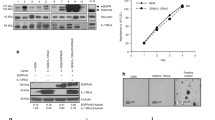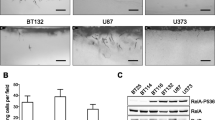Abstract
Glioblastoma (GBM) is the most common and deadly form of primary brain tumor with a median survival of eleven months, despite use of extensive chemotherapy, radiotherapy and surgery. We have previously shown that nuclear factor-kappa B (NF-κB) is aberrantly expressed in GBM tumors and primary cell lines derived from tumor tissue. Here we show that IL-8, a chemokine is also aberrantly expressed by GBM cell lines and expression of IL-8 is in large part, attributable to the aberrant activation of NF-κB. We hypothesized that invasiveness of GBM cells is driven at least in part by aberrantly expressed IL-8. In support of the hypothesis we found that treatment of glioma cells with an IL-8 neutralizing antibody markedly decreased their invasiveness compared to cells treated with control IgG or left untreated. Furthermore, downregulation of IL-8 protein production with use of IL-8 targeted siRNA also resulted in decreased invasion in matrigel. We next investigated the presence of IL-8 receptors by FACS analysis and found that GBM cells (U87, U251, D54 and LN229) only express CXCR1 but not CXCR2. Treatment of U87 cells with a blocking CXCR1 antibody reduced their invasion through matrigel. Finally, we found that addition of exogenous IL-8, following downregulation of NF-κB which results in loss of endogenous IL-8 production, incompletely restored tumor cell invasion. Our data indicate that IL-8 is necessary but not solely responsible for glioma cell invasion and mediates its effect in an autocrine manner.







Similar content being viewed by others
References
Maher EA, Furnari FB, Bachoo RM et al (2001) Malignant glioma: genetics and biology of a grave matter. Genes Dev 15(11):1311–1333
Wittekind C, Neid M (2005) Cancer invasion and metastasis. Oncology 69(Suppl 1):14–16
Slettenaar VI, Wilson JL (2006) The chemokine network: a target in cancer biology? Adv Drug Deliv Rev 58(8):962–974
Van Meir EG, Ceska M, Effenberger F et al (1992) Interleukin-8 is produced in neoplastic and infectious diseases of the human central nervous system. Cancer Res 52(16):4297–4305
Van Meir EG (1995) Cytokines and tumors of the central nervous system. Glia 15(3):264–288
Brat DJ, Bellail AC, Van Meir EG (2005) The role of interleukin-8 and its receptors in gliomagenesis and tumoral angiogenesis. Neuro-oncology 7(2):122–133
Smyth MJ, Zachariae CO, Norihisa Y, Ortaldo JR, Hishinuma A, Matsushima K (1991) IL-8 gene expression and production in human peripheral blood lymphocyte subsets. J Immunol 146(11):3815–3823
Xie K (2001) Interleukin-8 and human cancer biology. Cytokine Growth Factor Rev 12(4):375–391
Hoffmann E, Dittrich-Breiholz O, Holtmann H, Kracht M (2002) Multiple control of interleukin-8 gene expression. J Leukoc Biol 72(5):847–855
Green AR, Green VL, White MC, Speirs V (1997) Expression of cytokine messenger RNA in normal and neoplastic human breast tissue: identification of interleukin-8 as a potential regulatory factor in breast tumours. Int J Cancer 72(6):937–941
Yoneda J, Kuniyasu H, Crispens MA, Price JE, Bucana CD, Fidler IJ (1998) Expression of angiogenesis-related genes and progression of human ovarian carcinomas in nude mice. J Natl Cancer Inst 90(6):447–454
Shi Q, Abbruzzese JL, Huang S, Fidler IJ, Xiong Q, Xie K (1999) Constitutive and inducible interleukin 8 expression by hypoxia and acidosis renders human pancreatic cancer cells more tumorigenic and metastatic. Clin Cancer Res 5(11):3711–3721
Koch AE, Polverini PJ, Kunkel SL et al (1992) Interleukin-8 as a macrophage-derived mediator of angiogenesis. Science 258(5089):1798–1801
Strieter RM, Kunkel SL, Elner VM et al (1992) Interleukin-8. A corneal factor that induces neovascularization. Am J Pathol 141(6):1279–1284
Bar-Eli M (1999) Role of interleukin-8 in tumor growth and metastasis of human melanoma. Pathobiology 67(1):12–18
Bates RC, DeLeo MJ, Mercurio AM (2004) The epithelial-mesenchymal transition of colon carcinoma involves expression of IL-8 and CXCR-1-mediated chemotaxis. Exp Cell Res 299(2):315–324
Brew R, Erikson JS, West DC, Kinsella AR, Slavin J, Christmas SE (2000) Interleukin-8 as an autocrine growth factor for human colon carcinoma cells in vitro. Cytokine 12(1):78–85
Holmes WE, Lee J, Kuang WJ, Rice GC, Wood WI (1991) Structure and functional expression of a human interleukin-8 receptor. Science 253(5025):1278–1280
Murphy PM, Tiffany HL (1991) Cloning of complementary DNA encoding a functional human interleukin-8 receptor. Science 253(5025):1280–1283
Li A, Varney ML, Singh RK (2001) Expression of interleukin 8 and its receptors in human colon carcinoma cells with different metastatic potentials. Clin Cancer Res 7(10):3298–3304
Richardson RM, Marjoram RJ, Barak LS, Snyderman R (2003) Role of the cytoplasmic tails of CXCR1 and CXCR2 in mediating leukocyte migration, activation, and regulation. J Immunol 170(6):2904–2911
Raychaudhuri B, Han Y, Lu T, Vogelbaum MA (2007) Aberrant constitutive activation of nuclear factor kappaB in glioblastoma multiforme drives invasive phenotype. J Neurooncol 85(1):39–47
Kubo F, Ueno S, Hiwatashi K et al (2005) Interleukin 8 in human hepatocellular carcinoma correlates with cancer cell invasion of vessels but not with tumor angiogenesis. Ann Surg Oncol 12(10):800–807
Inoue K, Slaton JW, Eve BY et al (2000) Interleukin 8 expression regulates tumorigenicity and metastases in androgen-independent prostate cancer. Clin Cancer Res 6(5):2104–2119
Subramaniam D, May R, Sureban SM et al (2008) Diphenyl difluoroketone: a curcumin derivative with potent in vivo anticancer activity. Cancer Res 68(6):1962–1969
Egberts JH, Cloosters V, Noack A et al (2008) Anti-tumor necrosis factor therapy inhibits pancreatic tumor growth and metastasis. Cancer Res 68(5):1443–1450
Yamanaka R, Tanaka R, Yoshida S, Saitoh T, Fujita K (1995) Growth inhibition of human glioma cells modulated by retrovirus gene transfection with antisense IL-8. J Neurooncol 25(1):59–65
Smith MC, Luker KE, Garbow JR et al (2004) CXCR4 regulates growth of both primary and metastatic breast cancer. Cancer Res 64(23):8604–8612
Wakabayashi K, Kambe F, Cao X et al (2004) Inhibitory effects of cyclosporin A on calcium mobilization-dependent interleukin-8 expression and invasive potential of human glioblastoma U251MG cells. Oncogene 23(41):6924–6932
Desbaillets I, Diserens AC, Tribolet N, Hamou MF, Van Meir EG (1997) Upregulation of interleukin 8 by oxygen-deprived cells in glioblastoma suggests a role in leukocyte activation, chemotaxis, and angiogenesis. J Exp Med 186(8):1201–1212
de la Iglesia N, Konopka G, Lim KL, Nutt CL, Bromberg JF, Frank DA, Mischel PS, Louis DN, Bonni A (2008) Deregulation of a STAT3-interleukin 8 signaling pathway promotes human glioblastoma cell proliferation and invasiveness. J Neurosci 28(23):5870–5878
Flynn G, Maru S, Loughlin J, Romero IA, Male D (2003) Regulation of chemokine receptor expression in human microglia and astrocytes. J Neuroimmunol 136(1–2):84–93
Zhou Y, Larsen PH, Hao C, Yong VW (2002) CXCR4 is a major chemokine receptor on glioma cells and mediates their survival. J Biol Chem 277(51):49481–49487
Luppi F, Longo AM, de Boer WI, Rabe KF, Hiemstra PS (2007) Interleukin-8 stimulates cell proliferation in non-small cell lung cancer through epidermal growth factor receptor transactivation. Lung Cancer 56(1):25–33
Author information
Authors and Affiliations
Corresponding author
Electronic supplementary material
Below is the link to the electronic supplementary material.
Rights and permissions
About this article
Cite this article
Raychaudhuri, B., Vogelbaum, M.A. IL-8 is a mediator of NF-κB induced invasion by gliomas. J Neurooncol 101, 227–235 (2011). https://doi.org/10.1007/s11060-010-0261-2
Received:
Accepted:
Published:
Issue Date:
DOI: https://doi.org/10.1007/s11060-010-0261-2




